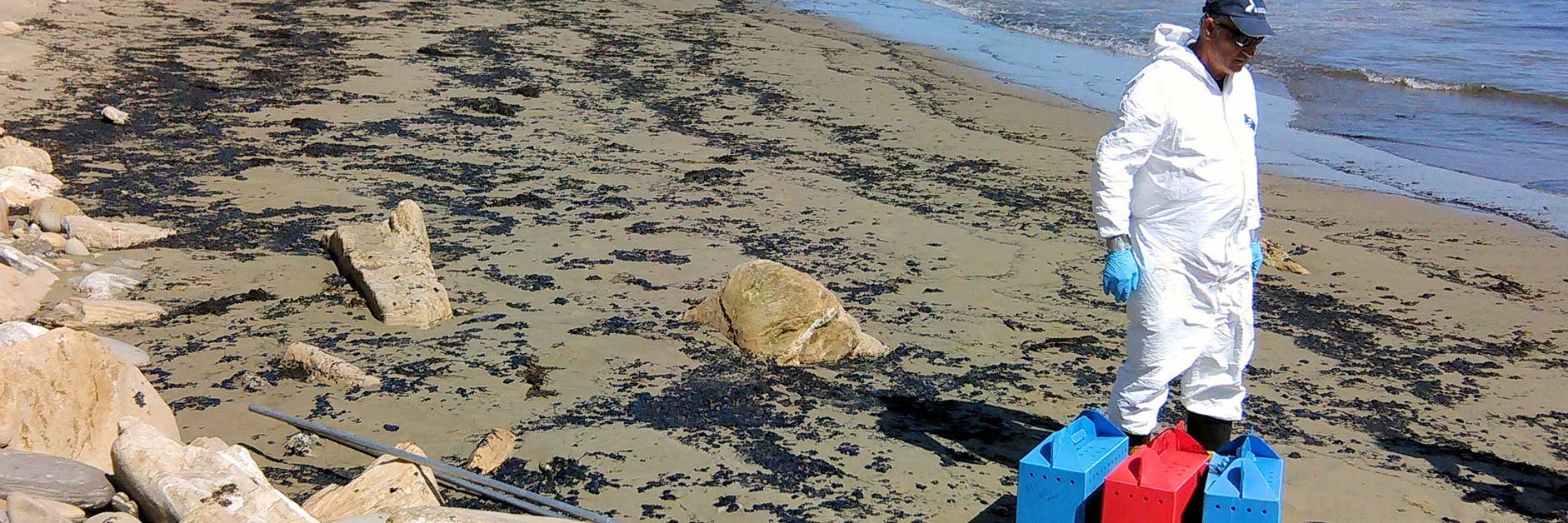On Tuesday, May 19, 2015, an onshore pipeline owned by Plains All American Pipeline ruptured, spilling an estimated 143,000 gallons of crude oil onto the Gaviota Coast, one of the last remaining stretches of pristine undeveloped coastline in California. At least 21,000 gallons spilled into the Santa Barbara Channel.
This environmental disaster took a terrible toll on the environment, wildlife, the local economy, and our community. It killed or injured hundreds of birds, marine mammals and fish, forced the weeks-long closure of Refugio and El Capitan State Beaches and 138 square miles of fishing grounds, fouled more than 40 miles of shoreline, and negatively impacted local businesses, tourists and residents.
Santa Barbara Channelkeeper rose swiftly to the challenges posed by this crisis, working tirelessly to investigate the circumstances behind the spill, monitor the environmental impacts, keep the public informed, and advocate for policy reforms to help prevent a disaster like this from happening again.
In the immediate aftermath of the spill, Channelkeeper was out on our boat, up in airplanes, and on the affected beaches bird dogging the response, monitoring the extent of the spill and photo- and video-documenting impacts on the water, shoreline and wildlife. We conducted underwater surveys at the nearby Naples Marine Protected Area (MPA) and the kelp forest and eelgrass bed at Refugio, and collaborated with researchers from Cal State Channel Islands to deploy underwater ROVs to scout for oil on the seafloor.
Then, as tar balls started washing up on beaches in Ventura, LA and Orange counties, we quickly created an online reporting form for people who observe oil on beaches to fill out and submit to us. We compiled these observations and cultivated relationships with key officials inside the Unified Command to ensure that our reports were informing the official clean-up. At the request of the California Department of Fish and Wildlife’s Office of Spill Prevention and Response (OSPR), we also incorporated oil observations into our MPA Watch Program, and we provide that data to OSPR.
The existence of profuse natural seeps in the Santa Barbara Channel confounded the spill response, with the ability to differentiate tar balls attributable to the Refugio spill from seeps emerging as a key challenge. So, at the urging of Channelkeeper and our allies, OSPR and the US Coast Guard organized an intensive monitoring effort to survey and collect tar ball samples on beaches from Gaviota to Huntington Beach, which were then fingerprinted to determine their origin. Channelkeeper represented the environmental community in this effort.
We subsequently developed a systematic, long-term monitoring program to record standardized tar ball data on 14 beaches along the Santa Barbara Channel on a quarterly basis in order to establish a baseline that can be used to differentiate spills from natural seeps as well as to help identify new spills in the future.
In addition to these monitoring efforts, Channelkeeper collaborated with other environmental groups, businesses and policy makers to advocate for a thorough clean-up, stringent enforcement against Plains, and policy reforms to improve spill prevention and response. We were a lead advocate for a package of bills ultimately adopted by the California Legislature in 2015 to improve oil spill prevention and response, and we continue to participate in meetings of the LA/Long Beach Area Committee to ensure that spill response plans for our region are strengthened to address key lessons learned from the Refugio Spill. Our staff maintain current HAZWOPER certifications and participate in oil spill response drills so that we are prepared to assist in the event of a future spill.
Channelkeeper also developed an Oil Spill Resource Guide to provide useful information and resources to help concerned citizens understand the threats posed by oil spills, the mechanics of oil spill response, what to do (and not do) to get involved, and more.
The Refugio Oil Spill served as a crude reminder of just how vulnerable our environment is to the inherent risk of oil spills, and how much our community, wildlife, and our local economy depend on a clean, healthy ocean. Channelkeeper is committed to lending our unique skills and resources to aid in the response to any future spills and to doing all we can to help ensure this kind of disaster never happens here again.
